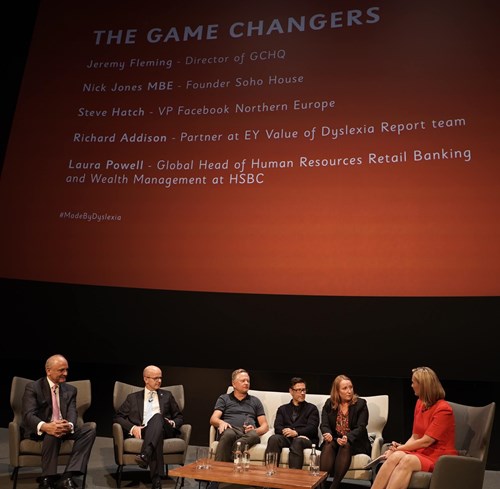- Managing people
Value of Dyslexia in Organizations
A new EY report highlights the value of dyslexic capability and neuro-diversity for organizations of the future
“Our business looks to diversity of thought to remain competitive, continuously innovate and drive better business performance.” Justine Campbell, Managing Partner, Talent, EY UK&I
A new report, launched this week at 2nd Global Dyslexia Summit, shows how the inherent strengths of dyslexic individuals, such as the ability to think creatively and laterally, can be invaluable for organizations of the future. It specifically highlights how the dyslexic way of thinking can play a critical role in helping organizations adapt to the AI-enabled world of machine learning and the 4th industrial revolution.
The report brings to mind those two buzzwords of organizational development – diversity and innovation. The concept of diversity in organizations is about more than achieving gender and ethnicity balance; it is about welcoming diverse ways of thinking and perception. To foster the innovation necessary to navigate today’s fast changing business environment, organizations need constant access to new ideas and different ways of thinking and seeing the world.
 Hosted by the charity Made by Dyslexia at London’s Science Museum, the Summit brought together leading dyslexic voices from around the world including Sir Richard Branson, Jeremy Fleming, Director of GCHQ, and Health Secretary, Rt. Hon. Matt Hancock (pictured). Focused on the disappointing fact that our schools remain severely behind the curve in their understanding and support of dyslexia, the Summit was given heightened relevance through the acknowledgement, emphasised in the EY report and personified by the luminaries present, that dyslexic talent can be extremely valuable to employers and is becoming increasingly so.
Hosted by the charity Made by Dyslexia at London’s Science Museum, the Summit brought together leading dyslexic voices from around the world including Sir Richard Branson, Jeremy Fleming, Director of GCHQ, and Health Secretary, Rt. Hon. Matt Hancock (pictured). Focused on the disappointing fact that our schools remain severely behind the curve in their understanding and support of dyslexia, the Summit was given heightened relevance through the acknowledgement, emphasised in the EY report and personified by the luminaries present, that dyslexic talent can be extremely valuable to employers and is becoming increasingly so.
With machines now undertaking many of the tasks previously undertaken by humans – the very tasks dyslexic individuals have always found challenging – the world of work is changing. In order to interact successfully with AI, robots, quantum computing and all of the technological advances that are fuelling our future, organizations will require a new way of thinking and decision making. As Darden Business School’s Professor Ed Hess suggests in his book Humility Is the New Smart: "In the AI age, 'being smart' will mean something completely different."
In the AI era jobs that require higher-order critical, creative, and innovative thinking and the jobs that require high emotional engagement will be in high demand. The challenge for organizations is that most of us are confirmation-seeking and defensive in the way we think. 1 in 10 people, however, are influenced by dyslexia, which is a genetic difference in an individual’s ability to learn and process information. A number of high-profile organizations have come to recognise the value of dyslexic thinking and problem-solving skills and the need to adapt to welcome and accommodate these skills.
“Dyslexic individuals should no longer be expected to ‘fit in’ but ‘stand out’, and focus on their strengths. Businesses, and educators must lean in and adapt their organizations and systems to embrace this change, and fast, if we are to truly build the workforce of tomorrow.” Kate Griggs, Founder and CEO, Made by Dyslexia.
…………………………………………………………………………………………………………
…………………………………………………………………………………………………………
“Organizations that are able to crack the code between neuro-diversity, organizational culture, and workforce augmentation, will be at the forefront of driving even greater business value. This can only be achieved if organizational approaches to dyslexia....are at the front and centre of the organizational strategic agenda.” Ben Cooke, Senior Consultant, Strategy, EY.
What should organizations do about this?
In a recent EY survey, 87% of CEOs and business leaders said they would be investing in AI. This radical shift towards automation will require leaders to proactively prepare for future ways of working that will be fundamentally changed, and to recruit and develop a workforce with the capabilities to work effectively in collaboration with machines.
In this new environment there will be a declining demand for competencies such as reading skills, memory skills, and coordination and time management – skills associated with typical dyslexic challenges. Whereas there will be increasing demand for competencies such as leadership and social influence, creativity and initiative, analytic thinking and innovation – associated with typical dyslexic strengths.
As these demands change there are specific skills from dyslexia that organizations can tap into to better align human effort with automation in order to create a corporate culture fit to address the future.
Organizations need to develop a neuro-diverse capability that uses an understanding of varying cognitive profiles to enhance team performance. This is not an easy prospect and will require focused effort in reimaging recruitment, training and staff deployment policy, and critically in casting a wider net in the search for talent. But the evidence is the effort can be very rewarding.

⦁ ⦁ ⦁
The Summit saw the launch of two important initiatives from Made by Dyslexia:
1. Alongside the EY report, Made by Dyslexia published its own research Dyslexia in Schools – The Knowledge Gap which illustrates how schools and teachers remain severely behind the curve in their understanding and support of dyslexia. The key findings are that:
> 98% say teachers need more training in dyslexia
> 91% say their schools need a better understanding of dyslexic strengths
> 84% say the process of identifying dyslexia in their school is difficult or just not possible
2. In light of this new research and recognising the urgent need for action, Made By Dyslexia is launching an advocacy movement, Connecting the Dots. Supported by Microsoft, the movement will galvanise parents, educators and governments to disseminate knowledge to create systemic change to level the playing-field so every dyslexic child can achieve their potential.
To learn more about these important initiatives please visit: http://madebydyslexia.org/ or contact: info@madebydyslexia.org
ARTICLES YOU MIGHT LIKE
BOOK REVIEW
UCL’s Colin Fisher explains how to understand the invisible forces of group dynamics to build and lead high-performing teams
DEVELOPING LEADERS QUARTERLY MAGAZINE AND WEEKLY BRIEFING EMAILS

































